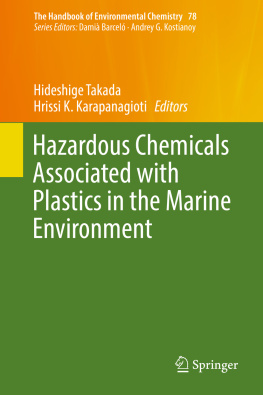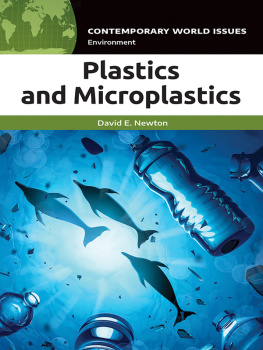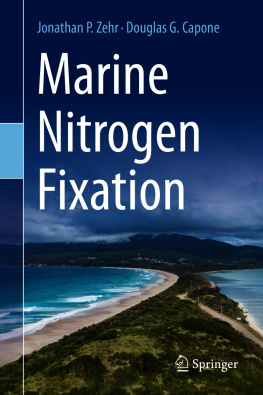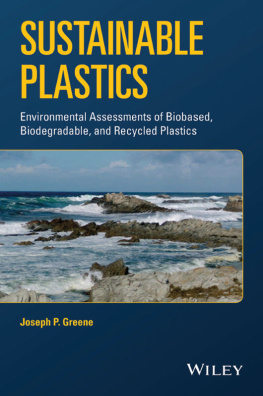Karapanagioti Hrissi K. - Hazardous Chemicals Associated with Plastics in the Marine Environment
Here you can read online Karapanagioti Hrissi K. - Hazardous Chemicals Associated with Plastics in the Marine Environment full text of the book (entire story) in english for free. Download pdf and epub, get meaning, cover and reviews about this ebook. year: 2019, genre: Children. Description of the work, (preface) as well as reviews are available. Best literature library LitArk.com created for fans of good reading and offers a wide selection of genres:
Romance novel
Science fiction
Adventure
Detective
Science
History
Home and family
Prose
Art
Politics
Computer
Non-fiction
Religion
Business
Children
Humor
Choose a favorite category and find really read worthwhile books. Enjoy immersion in the world of imagination, feel the emotions of the characters or learn something new for yourself, make an fascinating discovery.
- Book:Hazardous Chemicals Associated with Plastics in the Marine Environment
- Author:
- Genre:
- Year:2019
- Rating:4 / 5
- Favourites:Add to favourites
- Your mark:
- 80
- 1
- 2
- 3
- 4
- 5
Hazardous Chemicals Associated with Plastics in the Marine Environment: summary, description and annotation
We offer to read an annotation, description, summary or preface (depends on what the author of the book "Hazardous Chemicals Associated with Plastics in the Marine Environment" wrote himself). If you haven't found the necessary information about the book — write in the comments, we will try to find it.
Hazardous Chemicals Associated with Plastics in the Marine Environment — read online for free the complete book (whole text) full work
Below is the text of the book, divided by pages. System saving the place of the last page read, allows you to conveniently read the book "Hazardous Chemicals Associated with Plastics in the Marine Environment" online for free, without having to search again every time where you left off. Put a bookmark, and you can go to the page where you finished reading at any time.
Font size:
Interval:
Bookmark:
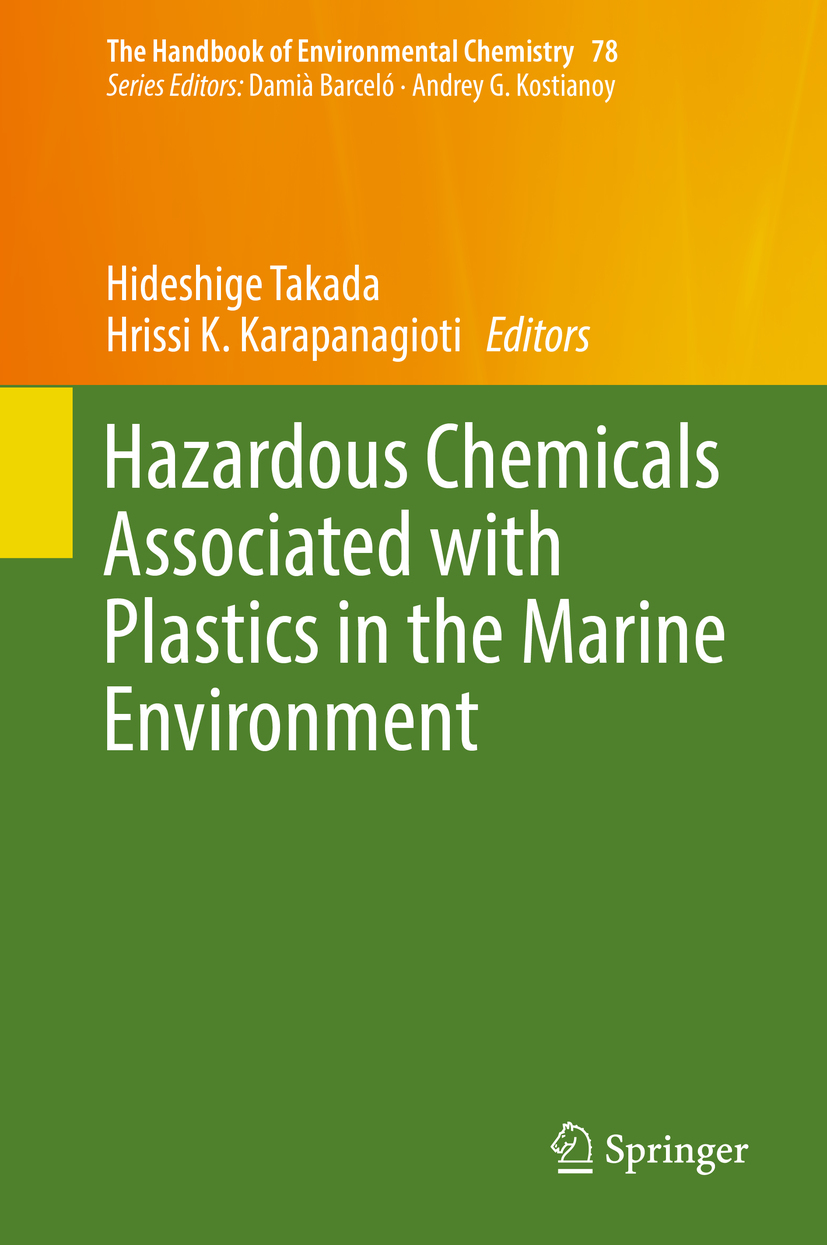
More information about this series at http://www.springer.com/series/698

This Springer imprint is published by the registered company Springer Nature Switzerland AG
The registered company address is: Gewerbestrasse 11, 6330 Cham, Switzerland
The Handbook of Environmental Chemistry is included in Springers eBook package Earth and Environmental Science . If a library does not opt for the whole package, the book series may be bought on a subscription basis.
For all customers who have a standing order to the print version of The Handbook of Environmental Chemistry , we offer free access to the electronic volumes of the Series published in the current year via SpringerLink. If you do not have access, you can still view the table of contents of each volume and the abstract of each article on SpringerLink ( www.springerlink.com/content/110354/ ).
Editorial Board
Aims and Scope
Instructions for Authors
Sample Contribution
All figures submitted in color are published in full color in the electronic version on SpringerLink.
Aims and Scope
Since 1980, The Handbook of Environmental Chemistry has provided sound and solid knowledge about environmental topics from a chemical perspective. Presenting a wide spectrum of viewpoints and approaches, the series now covers topics such as local and global changes of natural environment and climate; anthropogenic impact on the environment; water, air and soil pollution; remediation and waste characterization; environmental contaminants; biogeochemistry; geoecology; chemical reactions and processes; chemical and biological transformations as well as physical transport of chemicals in the environment; or environmental modeling. A particular focus of the series lies on methodological advances in environmental analytical chemistry.
With remarkable vision, Prof. Otto Hutzinger initiated The Handbook of Environmental Chemistry in 1980 and became the founding Editor-in-Chief. At that time, environmental chemistry was an emerging field, aiming at a complete description of the Earths environment, encompassing the physical, chemical, biological, and geological transformations of chemical substances occurring on a local as well as a global scale. Environmental chemistry was intended to provide an account of the impact of man's activities on the natural environment by describing observed changes.
While a considerable amount of knowledge has been accumulated over the last three decades, as reflected in the more than 70 volumes of The Handbook of Environmental Chemistry , there are still many scientific and policy challenges ahead due to the complexity and interdisciplinary nature of the field. The series will therefore continue to provide compilations of current knowledge. Contributions are written by leading experts with practical experience in their fields. The Handbook of Environmental Chemistry grows with the increases in our scientific understanding, and provides a valuable source not only for scientists but also for environmental managers and decision-makers. Today, the series covers a broad range of environmental topics from a chemical perspective, including methodological advances in environmental analytical chemistry.
In recent years, there has been a growing tendency to include subject matter of societal relevance in the broad view of environmental chemistry. Topics include life cycle analysis, environmental management, sustainable development, and socio-economic, legal and even political problems, among others. While these topics are of great importance for the development and acceptance of The Handbook of Environmental Chemistry , the publisher and Editors-in-Chief have decided to keep the handbook essentially a source of information on hard sciences with a particular emphasis on chemistry, but also covering biology, geology, hydrology and engineering as applied to environmental sciences.
The volumes of the series are written at an advanced level, addressing the needs of both researchers and graduate students, as well as of people outside the field of pure chemistry, including those in industry, business, government, research establishments, and public interest groups. It would be very satisfying to see these volumes used as a basis for graduate courses in environmental chemistry. With its high standards of scientific quality and clarity,
Font size:
Interval:
Bookmark:
Similar books «Hazardous Chemicals Associated with Plastics in the Marine Environment»
Look at similar books to Hazardous Chemicals Associated with Plastics in the Marine Environment. We have selected literature similar in name and meaning in the hope of providing readers with more options to find new, interesting, not yet read works.
Discussion, reviews of the book Hazardous Chemicals Associated with Plastics in the Marine Environment and just readers' own opinions. Leave your comments, write what you think about the work, its meaning or the main characters. Specify what exactly you liked and what you didn't like, and why you think so.

